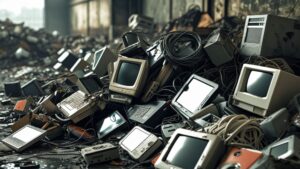In a decisive move to confront South Africa’s mounting electronic waste crisis, the Department of Forestry, Fisheries and the Environment (DFFE) has launched a groundbreaking community-based initiative in the North West Province. Announced during a Service Delivery Imbizo in Rustenburg, the initiative is a bold step toward building an environmentally responsible culture of electronic recycling.

Understanding E-Waste: A Modern Toxic Threat
Electronic waste, or e-waste, refers to discarded electrical or electronic devices. These include common items such as mobile phones, televisions, computers, printers, batteries, cables, microwaves, fridges, and even broken light bulbs. E-waste is one of the fastest-growing waste streams in the world due to rapid technological advancement and consumer demand.
Unlike organic or biodegradable waste, e-waste contains a complex mixture of valuable and hazardous materials. Precious metals like gold, silver, and copper are often found in devices, but so are dangerous substances such as lead, mercury, cadmium, brominated flame retardants, and lithium-ion compounds. If not properly managed, these can leach into soil and water or release toxic gases when burned.
South Africa E-Waste Challenge
South Africa generates approximately 360,000 tons of e-waste annually. Despite the scale of the problem, less than 10% of this waste is properly collected or recycled. Most ends up in landfills or is dumped illegally posing significant risks to the environment and human health.
The informal processing of e-waste, including unsafe burning and dismantling, exposes workers to poisonous fumes and residues. Communities near dump sites also face heightened risks of contamination through air, water, and food sources.
Community-Centered Solutions in Rustenburg
The new initiative in Rustenburg is part of a national strategy to introduce responsible and inclusive e-waste solutions. It empowers local communities through collaboration between the government, municipalities, the private sector, and Producer Responsibility Organisations (PROs).
One of the most practical features of the program is the distribution of special “wheelie bins” to households. These bins are reserved exclusively for old or broken electronics and are placed at accessible drop-off zones. A logistics framework then ensures the safe collection and transportation of e-waste to certified recycling facilities.
This system provides a simple, effective method for residents to contribute to environmental protection, turning e-waste from a hazard into a resource.
The Role of Extended Producer Responsibility (EPR)
The initiative is supported by South Africa’s Extended Producer Responsibility (EPR) legislation, which was enacted in November 2021. EPR requires producers and importers of electronics to take full responsibility for the end-of-life management of their products, including collection, safe recycling, and disposal.
By combining policy enforcement with real-world community engagement, the DFFE aims to build a replicable model for other provinces to adopt. This creates a framework in which environmental accountability is shared by manufacturers, consumers, and the government.
Environmental and Health Safeguards
E-waste contains hazardous components that can enter food chains or water systems if improperly discarded. For instance, mercury from batteries can damage kidneys and the nervous system, while lead from circuit boards can cause developmental problems in children.
The Rustenburg project ensures that harmful components are handled by trained professionals using protective equipment and environmentally safe recycling methods. Preventing e-waste from mixing with regular household trash reduces the risk of contamination and aligns with global best practices.
Precautions for Households and Individuals
To support the success of the initiative, residents are encouraged to adopt key precautions:
- Never burn or crush electronic devices.
- Do not throw e-waste in regular trash bins.
- Separate used electronics and store them in a dry place until disposal.
- Remove batteries from devices if possible.
- Look for certified drop-off points or collection bins in your area.
- Reuse or donate electronics that still function.
Solutions for Long-Term Change
Beyond the current rollout, long-term solutions will depend on public education, private sector innovation, and continued investment in recycling infrastructure. Key strategies include:
- Developing school and workplace awareness campaigns.
- Promoting the circular economy through product repair, reuse, and refurbishment.
- Strengthening enforcement of illegal dumping laws.
- Supporting research and development for sustainable materials.
- Expanding green jobs in the e-waste recycling sector.
A National Model for Sustainability
The Rustenburg e-waste initiative is designed as a pilot for broader national implementation. Its success could lay the foundation for a countrywide shift toward responsible e-waste management, reducing South Africa’s environmental burden while promoting economic opportunity through recycling.
This pioneering effort highlights the importance of public participation, legislative support, and cross-sector collaboration in building a greener, safer, and more sustainable future for all South Africans.
As global demand for technology grows, South Africa’s commitment to addressing the hidden dangers of e-waste could serve as a model for other developing nations facing similar environmental challenges.
